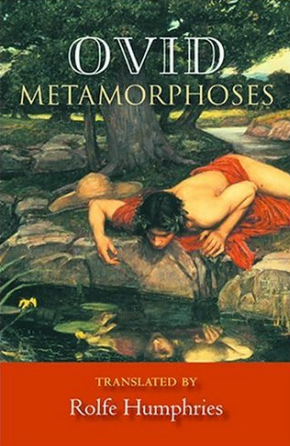By Chelsea Thornton (The Cascade) – Email
Print Edition: July 8, 2011
 For many modern readers, their primary source knowledge of Greco-Roman mythology is Disney’s Hercules. That story is in this book, but so is a mosaic of other Roman myths and pseudo-histories that never received the Disney treatment. These myths, enshrined by Ovid around 8 A.D., have been formative factors in the development of Western culture, and have been immortalized over and over again by Shakespeare, Milton, Donne, Tennyson, and Eliot, amongst others. In Metamorphoses, Ovid captures some of the most iconic stories ever told, and demonstrates the power of literature to convey a moment in history. No wonder almost every writer since has drawn inspiration from Ovid at some point.
For many modern readers, their primary source knowledge of Greco-Roman mythology is Disney’s Hercules. That story is in this book, but so is a mosaic of other Roman myths and pseudo-histories that never received the Disney treatment. These myths, enshrined by Ovid around 8 A.D., have been formative factors in the development of Western culture, and have been immortalized over and over again by Shakespeare, Milton, Donne, Tennyson, and Eliot, amongst others. In Metamorphoses, Ovid captures some of the most iconic stories ever told, and demonstrates the power of literature to convey a moment in history. No wonder almost every writer since has drawn inspiration from Ovid at some point.
The power of this translation lies in how approachable the language is. This book doesn’t read like a dusty scholarly work; it sounds more like the voice of some mischievous grandfather hiding scandalous morsels amongst the stories’ morals. Humphries uses plain but vibrant English, and the ease of reading allows you to focus on the love stories, revenge fantasies, and heroic adventures that Ovid collected. The friendly tone of the translation is well-suited to the material: these stories were meant to entertain first and moralize second.
The combination of gossip-worthy material and bard-next-door tone means that this book definitely does not need to be categorized as a textbook. If, however, you need it to act like one, it is admirable equipped: story titles and line numbers appear at the top of every page, the introduction holds some interesting insights into the historical context of the work and the challenges of translation, and the index/glossary combo is superb, providing a comprehensive list o mythological figures as well as a brief description for many of them.
Metamorphoses was written during the reign of Caesar Augustus, famous for his habit of using poets as propaganda agents. Ovid’s work culminates in the deification of Augustus’ ancestors, and, of course, Augustus himself. However, Augustus definitely didn’t get to claim all of the book’s immortalizing powers. The most awe-inspiring moment of the book is not a myth at all – in the closing lines of the poem Ovid predicts his own immortality:
Now I have done my work. It will end, / I trust, beyond Jove’s anger, fire and sword, / Beyond Time’s hunger… / I shall be read, and through all the centuries, / If prophecies of bards are ever truthful, / I shall be living always.
In reading these lines over two thousand years later, they still sound like true prophecy. Usually when we read classic works of literature, the reality of the author’s existence is shrouded by the time between the acts of writing and reading. Sometimes, like this, the barrier between writer and readier dissolves, and it feels like the writer is directly addressing you. These lines constitute one very epic “I told you so.”

